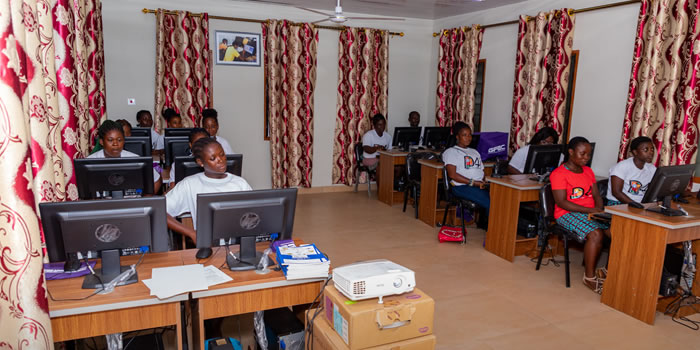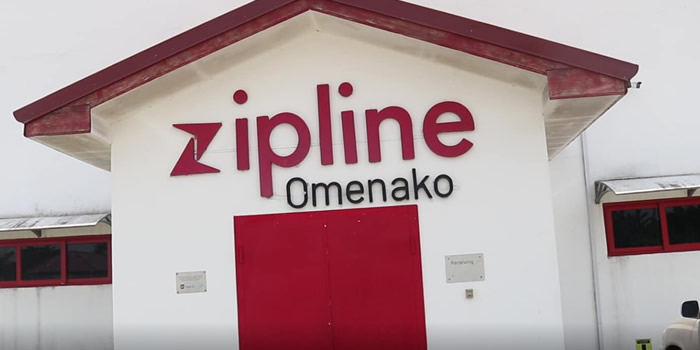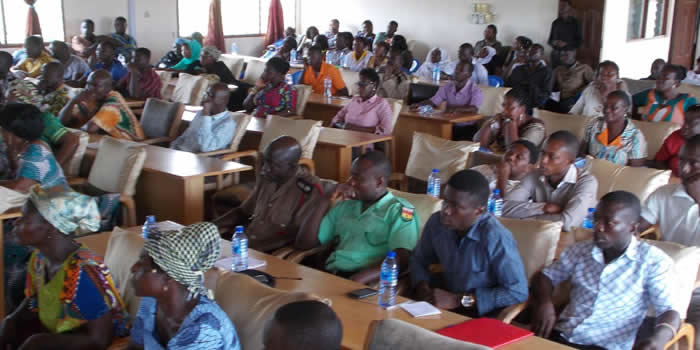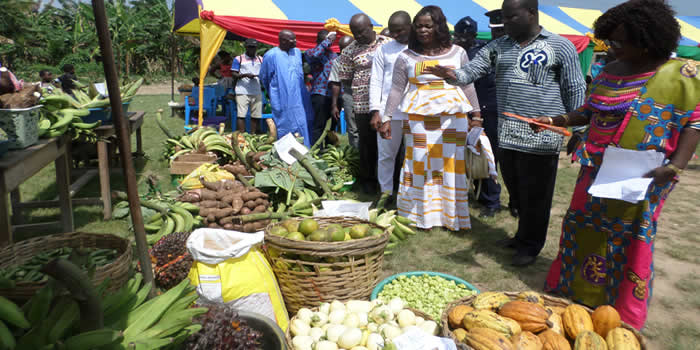

There is no large scale manufacturing setup in the municipality. Manufacturing is therefore restricted to the small-scale industries and crafts. However there is a government and textile factory that has been closed down since the 1980s.which the Assembly plans to convert into the nucleus of a skills acquisition centre for the youth.
Small-Scale Industries
They range from food processing to metal fabrication.Statistic on their production is very sketching but the table below indicates the number of establishments for selected group of small-scale industries.
Saw Milling and Wood Fabrication
There are only few saw mills in the municipality due to the shortage of timber. The operations of almost all the saw mills are detrimental to the natural environment since they depend on illegal chain-saw operators for timber.
The saw mills provide raw materials for the carpentry and joinery workshops. There are about 175 of them at the moment. They are mostly one-man enterprises consisting of a master and his apprentices. The average number of apprentices per workshop ranges between 2 and 7.
Metal Fabrication
This consists of blacksmithing and welders. Black smiths use iron scraps obtained from local dealers as their raw materials. Their products are mainly farming implements. There are only a few enterprises. Welders are engaged in fabrication of metal gates, window frames, metal containers that serve as temporally structure as well as vehicle repairs.
Food Processing
Food processing is mainly in the area of production of gari and corn dough and palm oil and palm kernel oil by traditional methods and machines.
There were great interventions in the supply of machinery for agro – processing ventures during the period, by the ministry of Food and Agriculture as well as the 6th Micro – Projects Programme. Some of the equipments were Corn Mills, Cassava Graters, Oil Palm Extractors, Oil Palm slashers, Palm kernel Crackers as well as diesel engines to drive the above mentioned machines.
Alcohol (AKPETESHIE) Distillation
The trade started first with the use of palm wine but sugar and yeast are now the main raw materials. The main source of energy is firewood which is obtained from the neighbouring districts of West and east Akyem and Atiwa.
Jato a town about 8km east of Suhum is synonymous with akpeteshie industry. Almost every household there is connected with the industry. The town is near Amanhyia on the Suhum-Koforidua road and thus transportation of the produce for sale is not a problem. It is a settlement whose inhabitations, from empirical observation, show signs of affluence compared to most other distillers.
Soap Making
Soap making is by both traditional and modern methods depending on the raw materials. The major input for traditional soap is ashes obtained from burnt cocoa husk, plantation and cassava peels etc, and palm oil or kernel oil, obtained in the district. The technology is crude: The ashes are added to boiling oil, stirred and allowed to cook for sometime. The product, which is very dark, is sold in the local markets and patronized by mainly rural people.
There is one formal sector producer of soap at Suhum, Chocho Soap Industries which manufacture anti-septic soap and body cream.
Other Small-scale Industries
These include tie-and-dye making, dressmaking and manufacturing of foot wear. The district has a many dressmakers and shoemakers. Raw materials for tie and dye are obtained from textile factories and shops in Accra and Tema.
Wood Products
Carving of drums, mortars, windmills, dolls and lathes is undertaken mainly in Suhum and Nankese. The workshops are normally located in open places along the road, which makes it easier for the supply of the main raw materials. (Neatly cut pieces of tree trunks) and marketing of the products.
Rattan
Cane and palm branches are used to make baskets throughout the district.
Pottery
Anum Apapam is noted for clay pots, which are sold on the local markets.
Craftwork
Craftworks can be classified into two main categories according to their use:
Domestic such as, pots & mortars and (B) Industrial for example wood mills and lathe turning and ornamentals such as dolls. They are patronized by both local and international tourists.
Commerce
Suhum is the commercial centre of the district. ¬Over 90% of the private stores are located there. It also has two markets, which are held on Mondays and Thursdays. There are other bi-weekly markets at Akorabo, Amanase, Akyeansa, Anum Apapam, Dokrochiwa, Coaltar, Ayekokooso etc. Traders from other places bring in their wares and farmers bring in foodstuffs during market days.
Apart from the markets some rural settlements also provide avenues for local traders and those from outside the district to buy food items in bulk and transport them to other places mostly outside the district. The district is also noted for many spots along the trunk roads where farmers and traders sell cassava, plantains, cocoyams, gari, and palm oil etc. to travelers.
Refer to the pdf file below for more tables.
Date Created : 11/27/2017 3:55:46 AM











 facebook
facebook
 twitter
twitter
 Youtube
Youtube
 +233 593 831 280
+233 593 831 280 0800 430 430
0800 430 430 GPS: GE-231-4383
GPS: GE-231-4383 info@ghanadistricts.com
info@ghanadistricts.com Box GP1044, Accra, Ghana
Box GP1044, Accra, Ghana